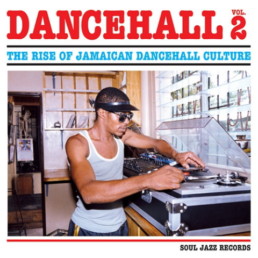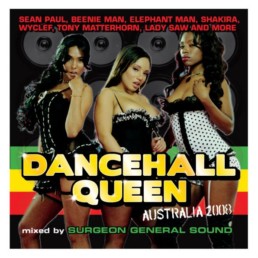UK label Soul Jazz Records, perhaps best known for their extensive Studio 1 compilations, has teamed up with renowned reggae writer Beth Lesser for their latest compilation outing – Dancehall – The Rise of Jamaican Dancehall Culture.
Lesser’s latest publication is certainly one of the most in depth looks into the Jamaican music scene in the 1980s to reach print, but what we’re concerned with here is the accompanying Soul Jazz two CD/LP compilation, ram full of 1980s dancehall killers, both band-backed and digital and undoubtedly a crucial companion in experiencing the aural nature of Lesser’s message.
The spread of music is certainly a very thorough (within the context of a two CD compilation) attempt to define the sound of the time, both in the early 1980s where bands such as the Roots Radics and Sly & Robbie’s Taxi Gang shaped the sound of Jamaica and later in the decade where the Casio keyboard took over and ‘Computer Rule’ was declared!
Whilst dedicated collectors need not apply, there’s ample material here for slightly less experienced listeners to lap up. Of course, the tunes here are well known and for good reason, but the scope of the compilation is wide enough that one doesn’t feel like they’re listening to the same old rehashed ‘best of’ compilation that some labels are guilty of on the odd occasion.
Anyway, time to discuss the tunes themselves. ‘Rub A Dub’ and it’s unmistakeably bubbling sound is well represented here with tunes like Michigan & Smiley’s Diseases, Triston Palma’s Entertainment, and Cornell Campbell’s Boxing, amongst numerous others. The overall theme here is indeed based firmly in the dancehall, with the majority of tracks reflecting the types of topics dancehalls singers and DJs typically concern themselves with.
This follows on into the later digital productions such as Horace Ferguson’s Sensi Addict, a killer early digital production from DJ turned producer Prince Jazzbo. More nice digital business features such as Conroy Smith’s Dangerous, another tune you probably won’t find on the typical compilation. The breadth of producers and artists featured is wide, which is certainly nice in the context of this kind of compilation.
The dedicated (perhaps obsessed?) reggae listener/selector will no doubt crave some slightly less known material but some credit has to be given to Soul Jazz for balancing in some relatively hidden gems amongst the more obvious tunes. At the end of the day, the tunes are solid and sure to light up any dance. If you’re looking to load up on big dancehall tunes it’s hard to see how you could go wrong.
Paradox
Related posts
Dancehall Vol. 2 – The Rise Of Jamaican Dancehall Culture
February 22, 2010
Dancehall Queen Australia 2008
October 5, 2008
Dancehall Nice Again – Sat 19 Jul 2014
July 19, 2014




